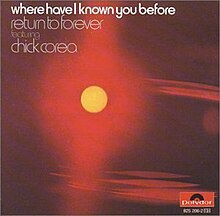Where Have I Known You Before
| Where Have I Known You Before | ||||
|---|---|---|---|---|
 |
||||
| Studio album by Return to Forever | ||||
| Released | 1974 | |||
| Recorded | July–August 1974 | |||
| Studio | Record Plant Studios, New York City | |||
| Genre | Jazz-rock | |||
| Length | 41:27 | |||
| Label | Polydor | |||
| Producer | Chick Corea | |||
| Return to Forever chronology | ||||
|
||||
| Professional ratings | |
|---|---|
| Review scores | |
| Source | Rating |
| Allmusic | |
| Sputnikmusic | |
| The Rolling Stone Jazz Record Guide | |
Where Have I Known You Before is the fourth album by jazz-rock fusion band Return to Forever, the second since leader Chick Corea had "revamped" the line-up and moved towards electric instrumentation, playing jazz fusion with clear influences from progressive rock.
While the style of music did not change much since the previous album, Hymn of the Seventh Galaxy (1973), important changes took place in the band's sound and line-up. Chick Corea, for instance, had started to use synthesizers (most notably the Moog Minimoog and ARP Odyssey synthesizers), developing the distinctive sound he became known for. An equally important change in the band was the replacement of guitarist Bill Connors with the then 20-year-old virtuoso Al Di Meola. Connors left the band before the recording of this album to concentrate on his acoustic solo career. Overall, the band developed a clearer, more focused sound and style. This was due in part to the personnel changes, the implementation of new technology, and new playing techniques, but it was also a product of more careful recording and production in the studio.
Between the album's longer tracks are three of Corea's short piano improvisations that all bear a title that begins "Where Have I...". The first track is Stanley Clarke's "Vulcan Worlds", which features some melodic motifs that would also appear on Clarke's self-titled second solo album Stanley Clarke the same year. The song proved Clarke "one of the fastest and most facile electric bassists around". Each player except for drummer Lenny White takes long solos. The next long track is Lenny White's composition "The Shadow of Lo", a complex piece with many changes in mood. The last track on Side A is Corea's "Beyond the Seventh Galaxy", a sequel to his "Hymn of the Seventh Galaxy", the title track from the group's previous album. Side B begins with the collective jam "Earth Juice". Most of Side B is taken up by Corea's 14-minute epic "Song to the Pharaoh Kings", a song notable for its use of the harmonic minor scale. The track has a long keyboard intro, after which Chick Corea is joined by the full band, and an "eastern" theme appears. Each member of the band plays a long solo.
...
Wikipedia
